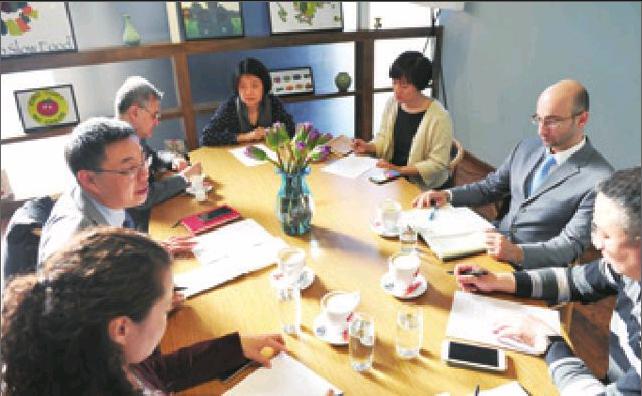A Question of Taste
2015-05-26ByJiJing
By+Ji+Jing

More than a quarter century after its foundation, which arose from an attempt to resist the building of a McDonalds in close proximity to the Spanish Steps in Rome, the international Slow Food movement has finally caught the slow boat to China.
“With its vast culinary culture, wealth of plants and animal diversity, and with the choices of Chinese consumers impacting the entire planet, Slow Food needs to be present in China,” said Sharon Aknin Sheets, Press Officer of Slow Food International.
The Slow Food China initiative was launched in Beijing on January 27. The formation of the organization links China to the rest of the global Slow Food network, which consists of over 100,000 individual members in more than 150 countries.
Many may be under the impression that the concept of slow food means, rather literally, to eat slowly; however, as President of Slow Food China Qiao Ling told Beijing Review, there is a lot more to the concept than that.
The Slow Food movement has its roots in the broader Slow Movement, first initiated in the 1980s by Carlo Petrini in Italy with the aims of safeguarding regional traditions, promoting good food and taking pleasure in gastronomy, as well as espousing a slower pace of life.
Preserving food diversity
One of the Slow Food movements mission statements is “good, clean and fair food for all.”
“Good, because it is healthy in addition to tasting good; clean because it is produced with low environmental impact and with animal welfare in mind; and fair because it respects the work of those who produce, process and distribute it,” said Sheets.
For example, a food production process involving the use of fertilizers would not meet the “clean” criterion as it may pollute soil. Food products exported all the way from South America to Beijing also fail the same acid test owing to the fact that their transportation increases the emission of carbon dioxide and other greenhouse gases.
The same is true for shark fins, because the process of obtaining them necessarily involves harm being done to wildlife. It is standard practice in the shark finning profession for the animals to be left to die in the ocean after the fins have been removed.
Moreover, if producers fail to receive reasonable compensation for their produce or if customers pay far in excess of the product in questions value, such food shall not be considered “fair.”
Finally, the phrase “for all” means everybody should have access to “good, clean and fair” food. According to Qiao, the right to enjoy high-quality food should not be reserved solely for the elite but should be shared by all.
While advocating this concept, Slow Food also works to protect food diversity. The creation of the Ark of Taste catalogue, which lists foods in danger of extinction, represents one initiative in this area. The project has been inspired by the biblical tale of Noahs Ark in the Bibles Book of Genesis, in which God saves Noah, his family and two of each of the worlds animal species from the flood. The Slow Food movement first popularized the notion of inviting people from countries worldwide to think about what food they would choose to take on the ark should such a deluge occur.
“Many local foods are disappearing owing to the prevalence of fast-food chains such as McDonalds. As supermarkets recognize only mass-produced food, small-scale food producers are finding it harder and harder to eke out a living. For example, if farmers who breed a small number of chickens are unable to sell them all, they will simply discontinue such breeding,” said Qiao.
“Our task is to protect small-scale food producers from the competition of large supermarkets and encourage them to continue to produce traditional local foods,” Qiao added.
This year, Slow Food China is looking to select around 100 varieties of foods from all over China so as to showcase them at a slow food exhibition to be held in September in Beijing. These selected foods may also be taken to Italy and displayed during the 2015 World Expo in Milan.
“The project aims to preserve both traditional local foods and the methods employed to produce them. They could take the form of a particular type of tea, cheese, ham or vinegar,” Qiao said.
Examples of ways of conserving these foods for future generations could be doing something as simple as supporting a producer by purchasing his or her product or spreading word of mouth. In cases of products that are related to endangered wildlife, consumers can reduce or altogether cease consumption of the products, in order to allow the species in question a chance to repopulate.
“Slow Food seeks to protect traditional and sustainable quality foods, defending the biodiversity of cultivated and wild varieties as well as methods of cultivation and production that are threatened by the prevalence of processed food, industrial agribusiness and the rules of the global market,” said Sheets.
Although Slow Food has set up its stall relatively late in China, it cannot be said that it is entirely a novel concept. In fact, unbeknownst to themselves, the Chinese have followed practices inherent to the movement, such as protecting food diversity, for some time now.
“For a long time, many local governments and food producers have been dedicated to searching for and producing signature local foods, which are typically what might be termed ‘slow food,” said Tan Xuewen, a researcher with the Rural Development Institute of the Chinese Academy of Social Sciences.
“Many Chinese restaurant chains have also kept alive and promoted a number of traditional local dishes,” Tan added.
Qiao said Chinese cuisine is unlikely to disappear under competition from Western fast food because the Chinese palates differ from those of their Western counterparts; wherever there are Chinese people, traditional Chinese food is never more than a stones throw away.
Growing relationships
Another aim of the Slow Food movement is the attempt to forge connections and build trust between food producers and consumers. Such an undertaking is particularly germane to Chinas situation, given the plethora of food safety scandals that have frayed the publics nerves and damaged relations between consumers and producers. To give but one contemporary example, ever since melaminetainted milk killed six infants in China in 2008, many Chinese parents no longer trust domestic brands and instead opt for foreignproduced baby formula.
Slow Food International hosts a food expo entitled Terre Madre (Mother Earth) every year in Italy. During the expo, food producers from around the world come face to face with consumers. This event grants consumers the opportunity to get to know the farmers who grow their vegetables or who breed the chickens they eat, thereby sowing the seeds of a relationship between food producers and consumers. Slow Food China also plans to hold its own Terre Madre expo this year in an attempt to mend the fragile relationship between producers and consumers in China.
According to Qiao, the priority for the organization at present is to develop its following in the Middle Kingdom. Members can be anyone located along the food supply chain, be they food producers, consumers or restaurant workers. Slow Food China will also identify producers whose production methods meet the necessary requirements and apply a “slow food” label to their products.
Qiao envisions a future where customers can be informed of restaurants or supermarkets in their cities serving food produced according to slow food standards through the use of mobile device software. She admitted, however, that it may take between five and 10 years to see this realized in China.
In the shorter term, the organization will carry out classes at Beijing primary schools designed to instruct students on which vegetables and fruits to eat in different seasons.
“Today as many vegetables are grown in greenhouses, people can have access to all kinds of vegetables all through the year. They no longer know when particular vegetables and fruits should be harvested if they are not grown in greenhouses,” said Sheng Pengxuan, a volunteer for the organization.
